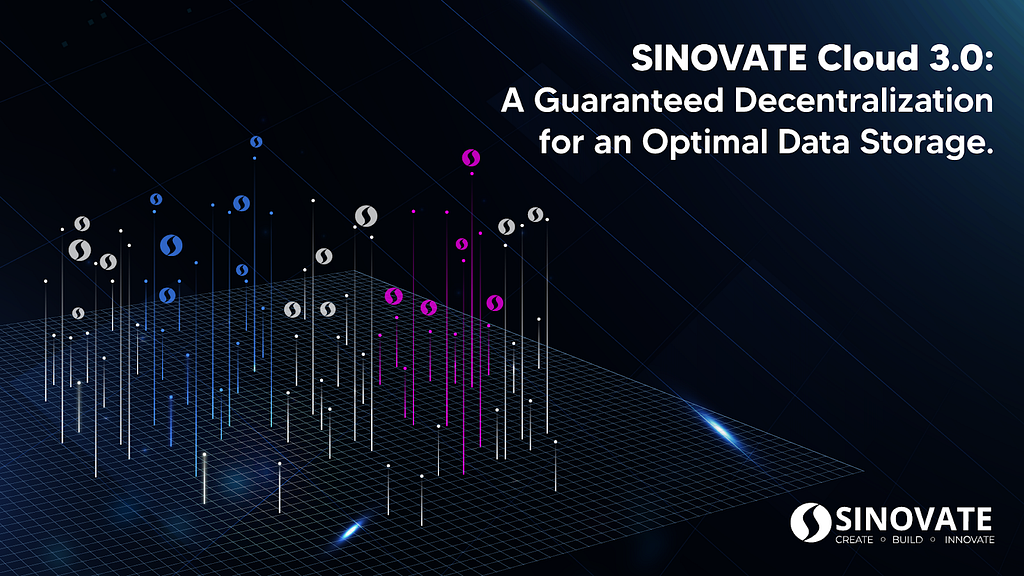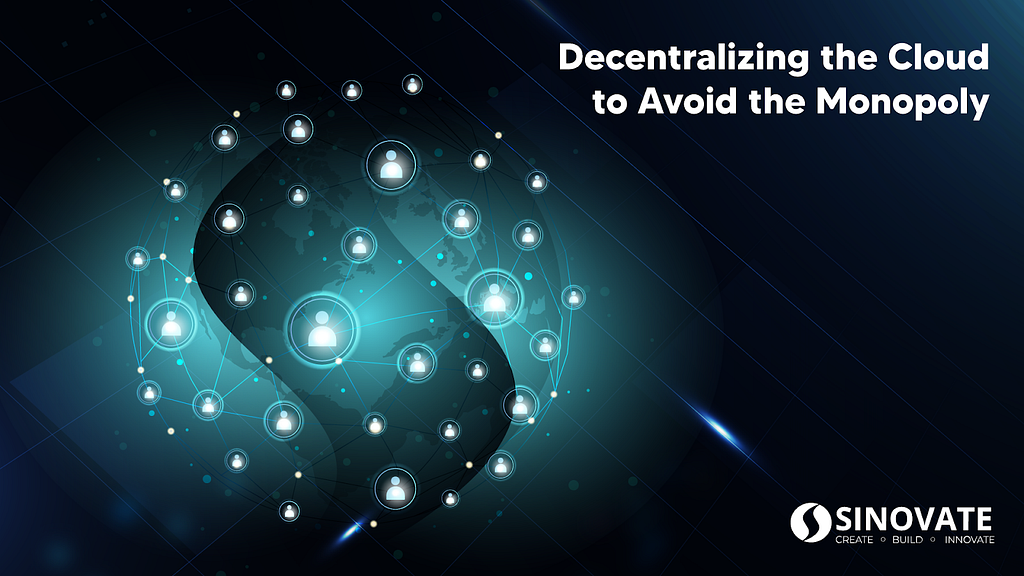
SINOVATE anticipates that the Cloud decentralization process will bring fairness and freedom in the data governance based on cost-effective and evolutive blockchain infrastructures. Data governance has become critical between some giant companies and countries because of the data market growth. People are increasingly aware of the risks associated with the data monopoly of massive companies, the lack of data anonymity, or the risk of data breaches with the storage centralization. Therefore, the next decade will show an increasing interest in novel solutions which will handle the quoted issues.
Cloud 3.0, also known as decentralized Cloud (dCloud), is a novel paradigm that leverages data storage with blockchain technologies. The goal is to achieve a secure, scalable, decentralized, end-to-end platform for industries, governments, and daily users. Nowadays, several dCloud projects enable data storage with drawbacks such as the lack of blockchain-based processes, high fees, mining power centralization, or low data throughput. Thus, SINOVATE decides in its early-stage development to guarantee decentralization and full exploitation of its blockchain technology without pre-mine, venture capital, or coin offering.
Decentralizing the Cloud to avoid the monopoly

The expansion of the Big Data paradigm leads to an exponential growth of the data storage markets, and many Cloud providers offer solutions for daily users or companies. The data market in 2025 will be worth close to 1 Trillion USD. Data storage services are the keystones of Artificial Intelligence, Data Analytics, smart grids, or smart home. However, the data market is globally controlled by giant technological companies who know the data owners, determine the costs, and control the data accessibility. This monopoly can be subject to issues with governments and people.
The challenge is to tackle these drawbacks for the common good in the blockchain world. However, the projects first must decide on the vital technological features to find the right balance between scalability, security, and decentralization. The last aspect is essential if the project wants to guarantee good governance in its infrastructure. In other words, Cloud 3.0 must limit the monopoly risks of a company or a group of individuals over the validation of data transfer and storage and technological evolution.
A panoply of decentralization approaches
The decentralization in Bitcoin is mainly guaranteed by the Proof-of-Work (PoW) algorithm in the Nakamoto consensus for validating blocks. The Bitcoin mining power is increasingly centralized by big corporations, allowing colossal purchasing amounts of hardware called ASICs. This slightly reduces the decentralization aspects of the network. Still, it does not impact blockchain governance because many mining companies are enormous. Projects using Proof-of-Stake (PoS), such as Ethereum 2.0, remain relatively decentralized depending on the wealth distribution. PoW and PoS approaches are way more decentralized than delegated PoS or other recent Byzantine Fault Tolerance (BFT) systems.
A decentralized Cloud requires a peer-to-peer (P2P) network where every peer allocates storage space for the network’s users. Adding blockchain enables a system based on data authenticity rewards or data storage contracts payments. SIA, STORJ, AKASH, and many others use a blockchain for payments and the authenticity of data storage contracts that interact with an external P2P network. The Cloud in this approach depends on the degree of decentralization selected by the P2P network. Furthermore, it is often supported by a company or an entity that can decide to disconnect or not a peer. This centralizes data governance. A solution like Filecoin decides to have blockchain mining as peers of the P2P Cloud network. This approach is close to PoW mining but leads to a mining centralization with an entity governing the network.
How does SINOVATE guarantee decentralization?
Decentralization in Cloud 3.0 is based on blockchain governance for transaction validation and the data governance of the storage infrastructure. Therefore, SINOVATE integrates multiple breakthrough technological features to ensure these two key points.
SINOVATE incorporated the InfinityNodes, a Proof-of-Services (PoSe) layer composed of three Tiers with different Proof-of-Burn (PoB) 12-month contract commitments. InfinityNodes will operate in NEPHELE: the Incorruptible Data Storage as peers of data storage. In addition, they will support other services related to the blockchain, such as instant payments or sidechain nodes. InfinityNode will also be able to vote on the development strategy of the blockchain because SINOVATE is a decentralized autonomous organization (DAO). This last feature is paramount for the future SINOVATE data governance called the Revolving Sovereignty Votes (RSV). This principle is built on the PoB contracts of InfinityNodes, which means an InfinityNode owner has a peer active only for 12 months. In this way, the data governance is renewed yearly with new actors, and existing actors must renew the contract every year. This avoids eternal voters where a data storage peer cannot enter “winter” mode. Hence, data governance is always guaranteed by very active contributors. Its decentralization grows with the increasing number of InfinityNodes per Tier or additional Tiers.
The SINOVATE blockchain is based on hybrid mining proofs that enable a proper decentralized transaction validation. The first proof is a novel solution called LockReward. It ensures that an InfinityNode can receive a reward based on the aggregated Schnorr signature of 20 randomly picked InfinityNodes. The block validation is naturally distributed among the InfinityNodes with an unlimited-growing network. The second proof is a PoW mining called X25X that has been designed for GPUs by hardening the mining from FPGAs and ASICs with limited power consumption. GPUs are present at home and many other locations on personal computers that spread the mining power in many hands. Finally, the last proof is PoS which provides a validation power across the owner of SIN coins that grows with the network usage. These approaches guarantee a true decentralization of the blockchain governance of SINOVATE.
What is the future evolution of SINOVATE?
SINOVATE focuses on building its ecosystem by providing all the most advanced features of the blockchain world. The first step is to offer the blockchain-based File Transfer Protocol (bFTP), the first concept toward NEPHELE, and allow financial, insurance, educational, or inheritance entities to manage their data. SINOVATE will reinforce its data governance with the RSV improvements to ensure its ecosystem’s timeless and continuous evolution. Finally, the InfiniteChain release will provide the technological components to create a blockchain connected with the dCloud. A sidechain project can decide not to activate data storage and delegate this to the SINOVATE mainchain decentralized manner.
Recent Comments